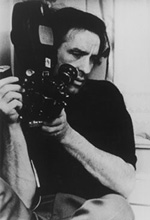
I remember the ultra low-budget Italian 'Giants of Jazz' compilation series, which served as a useful primer for budding jazz buffs and wannabe Benny Greens like myself. They boasted unsophisticated packaging and excruciating synopses of each jazz giant's career translated into a pidgin-This is Your Life English which often made for hilarious recitation ('and then, just as everything seemed to be going well for poor Gerry Mulligan, his dog died' or 'Chet Baker was down on his luck at this time, and Dizzy Gillespie lent him some false teeth'). The music was the thing, though, and the Cecil Taylor disc was no exception, mixing Taylor originals with his skewed takes on Ellington standards, demonstrating more clearly than any PhD thesis how Cecil was able to assimilate the past as effectively as trailblazing the future.
So, on this basis, the Giants of Jazz compilation remains the ideal starting point for anyone attempting to grapple with Taylor, as it highlights the principle of revolution within tradition. All roads in modern music lead to Taylor, a kind of volcanic Buddha able to harness experiments before him in order to relay a vision of order within chaos, 'as above so below' according to the Gnostic formula. In the inspirational 'Four Lives in the Bebop Business' by A. B. Spellman, Taylor provides useful clues to his temperament and creative aims, happy to cite Bartok and Stravinsky as influences in a way that sidesteps accusations of avant-garde contrariness for its own sake.
Cecil Taylor, architect, ballet dancer and photographer in jazz, in whose records a Cubist fascination with multiplicity and multiple identities sends you to the source of structure and form just as it seems to shatter them. The line-up on 'One Too Many...' also features Taylor's long-time sparring partner Jimmy Lyons on alto sax, Raphe Malik on trumpet and Ramsey Ameen on violin. The violin offers a combative counterpoint to Taylor's feisty bludgeoning of his instrument, a sirocco whipped up to complement the momentum of the firebrand pianist.
Enough words have been spilled on Taylor's fascination with dance and formal structure, so it would be nice to find a new angle on his music - to find a filmic analogy to Cecil Taylor's music. Pow! My father's moustache! I realize that Cassavetes' 'Killing of a Chinese Bookie' would be the perfect backdrop to his music. A film which captures the ebb and flow of consciousness, part hallucination and part fantasy. It delivers a pummelling of the senses as only Taylor can manage, while avoiding stylistic and genre cliches. Not a boxing film, not a film about gambling, not a film about Chinatown, not a film noir. Similarly, Taylor's music exists in a vacuum-sealed state of fermentation, where expectations and conventions are jostled and finally eliminated as excess baggage. The references remain to give a shadowy sense of familiarity: salt peanuts and goodbye pork pie hat... but not goodbye. Similarly Mr Sophistication's recurring signature tune 'I Can't Give You Anything But Love' is so far down it forgot which way is up, a negation of the memory of a forgotten embrace.

Thanks to Criterion, the two versions of 'Chinese Bookie' can now be
viewed side by side on the massive, enthralling Cassavetes DVD box set.
The differences
between the long 1976 and the shortened 1978 version are more than matters
of editorial judgement. They entail a different listening and
watching experience, Gazzara's white suit and cigar-smoke wreathed features
allowed to occupy more screen space and time in the longer 1st edition. Paradoxically,
the meditations on Gazzara's face during the longer takes serve to create
an even greater smokescreen between us and his missing interior.
The Cecil Taylor concert, recorded over two evenings, also thematizes distance
and impenetrability. Duets between elements of the unit ignite sparks, the
violin scraping against the trumpet's more domineering injunctions during
the music's bracing encounters. Abstract seismic shifts without titles,
as if Taylor wished to create a seance-like atmosphere rather than a musical
soiree. With Cassavetes' images, juxtapositions and senseless jumps are
all the more potent for their deliberate disorientation of the logic of consumption
(or do they simply consume logic?). The Chinese Bookie in the film seems
to be the bearer of ancient wisdom or practical advice,
but is quickly extinguished by Cosmo Vitelli's muffled gunshot, another blank
cipher in a film which plays tricks with a heavily marked deck of cards.
Taylor and his cohorts also push the limits of their practice by threatening
to tear up the rules of the game.
The title of the record, then - Edward Lear-style nonsense or structural echo of Taylor's unconscious processes? Probably both - my subtitle would be 'Sicilian Vespas'.
If you have ever braved a thoroughfare in a bustling southern Italian town with horns clanging and Vespas stinging their way past you, teenagers whooping with
new-found freedom, Taylor's wild excursions will leave you equally dazed and dazzled, in the safety of your living room.
'One Too Many Salty Swift and Not Goodbye' is available through Hatology, the reissue arm of Hat Art, in a limited to 3000 edition double CD set,
distributed by Harmonia Mundi
'The Criterion Collection: John Cassavetes Five Films' is available through Criterion DVD. Fans of Jonathan Lethem need no prompting to read his Cassavetes
tribute in the accompanying booklet.
© 2005 Marino Guida